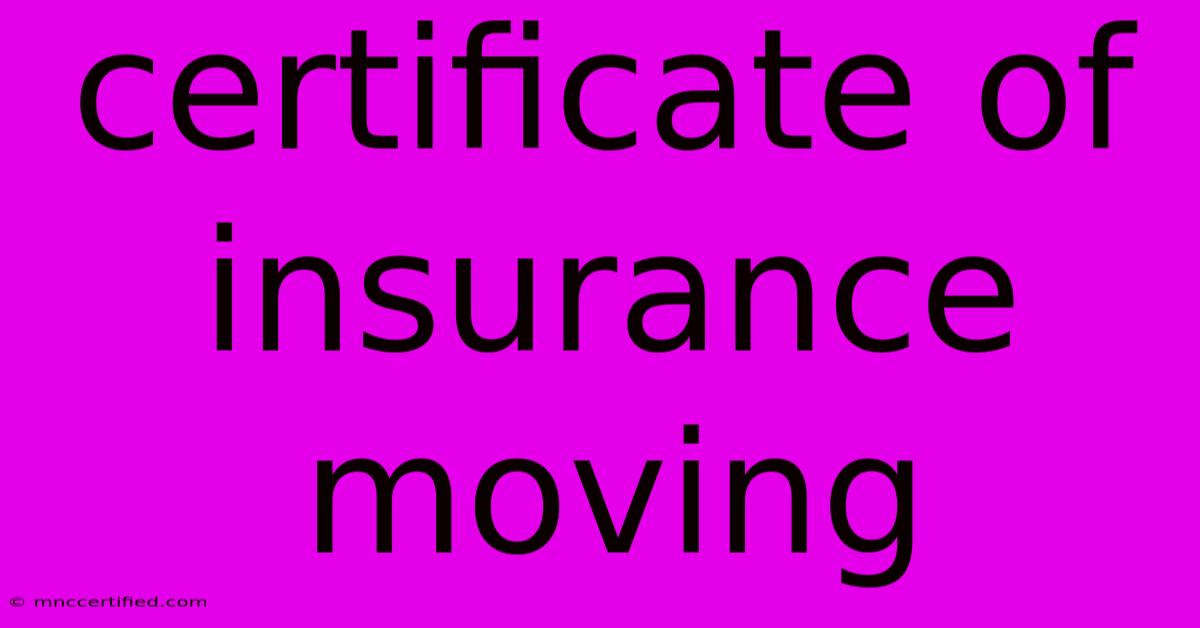Certificate Of Insurance Moving

Table of Contents
Certificate of Insurance for Movers: Your Protection Guide
Moving can be stressful. Between packing, loading, and the sheer logistics of relocating, the last thing you want to worry about is liability. This is where a Certificate of Insurance (COI) for your moving company becomes crucial. This comprehensive guide explains what a COI for movers is, why you need it, how to obtain one, and what to look for.
What is a Certificate of Insurance (COI) for Movers?
A Certificate of Insurance for movers is a document that verifies a moving company carries sufficient liability insurance. It's not the insurance policy itself, but rather an official summary confirming the existence and details of the coverage. This document protects you, the client, in case of accidents, damages, or other incidents during the move. Think of it as proof of their financial responsibility.
Key Information Included in a COI for Movers:
- Insurance Company Name and Contact Information: Knowing who to contact in case of a claim is vital.
- Moving Company Name and Address: This confirms the insurance is for the specific company handling your move.
- Policy Number: Allows verification of the insurance policy's authenticity.
- Coverage Types: This is crucial and should include general liability and auto liability insurance at a minimum. Look for specific amounts of coverage (e.g., $1 million general liability). Some movers also offer cargo insurance, protecting your belongings during transit. Workers' compensation insurance protects the moving company's employees in case of on-the-job injuries.
- Policy Effective Dates: Ensures the coverage is active during your move.
- Named Insured: This usually lists you, the client, as the recipient of this certificate, specifying your protection.
Why You Need a Certificate of Insurance from Your Mover
Requesting a COI isn't just a good idea; it's a necessary precaution. Here's why:
- Protection Against Damages: If the movers damage your property, the COI ensures you can file a claim against their insurance policy, potentially covering repair costs or replacement value.
- Liability Coverage: Accidents can happen. If a mover is injured on your property, their workers' compensation insurance (as stated on the COI) protects them, while general liability may protect you from potential lawsuits.
- Peace of Mind: Knowing your mover is insured gives you peace of mind, allowing you to focus on other aspects of your move without the added stress of potential financial liability.
- Professionalism: Reputable moving companies readily provide COIs. Reluctance to provide one could be a red flag, indicating a lack of insurance or professionalism.
- Compliance with Requirements: Some landlords or property management companies require proof of insurance from movers before allowing access to the property.
How to Obtain a Certificate of Insurance from Your Mover
The process is usually straightforward:
- Request a COI: Contact the moving company and explicitly request a Certificate of Insurance. Be specific about the date range for your move.
- Verify the Information: Carefully review the COI to ensure the information is accurate and the coverage amounts are sufficient. Don't hesitate to contact the insurance company listed to confirm the validity of the certificate.
- Keep a Copy: Maintain a copy of the COI for your records throughout the moving process and for a reasonable time afterward.
What to Look for in a Certificate of Insurance
Don't settle for a generic COI. Pay close attention to the following:
- Adequate Coverage Amounts: Higher coverage amounts offer better protection.
- Specific Coverage Types: Ensure general liability, auto liability, and ideally cargo insurance are included.
- Valid Policy Dates: Confirm the policy is active during your moving dates.
- Correct Company Information: Verify the moving company's name and address match your agreement.
In conclusion, obtaining a Certificate of Insurance from your moving company is a crucial step in protecting yourself and your belongings. Don't underestimate the importance of this document. By taking the time to request and review the COI, you can significantly reduce your risk and move with greater peace of mind. Remember, a reputable moving company will happily provide this documentation.

Thank you for visiting our website wich cover about Certificate Of Insurance Moving. We hope the information provided has been useful to you. Feel free to contact us if you have any questions or need further assistance. See you next time and dont miss to bookmark.
Featured Posts
-
Tuesday Euro Millions 140m Nov 19 Draw
Nov 23, 2024
-
Lamborghini Rocket League Price
Nov 23, 2024
-
Cleveland Redistricting Last Minute Rush
Nov 23, 2024
-
Security Alert Prompts Chester Police Action
Nov 23, 2024
-
Chester Citys Lantern Parade
Nov 23, 2024